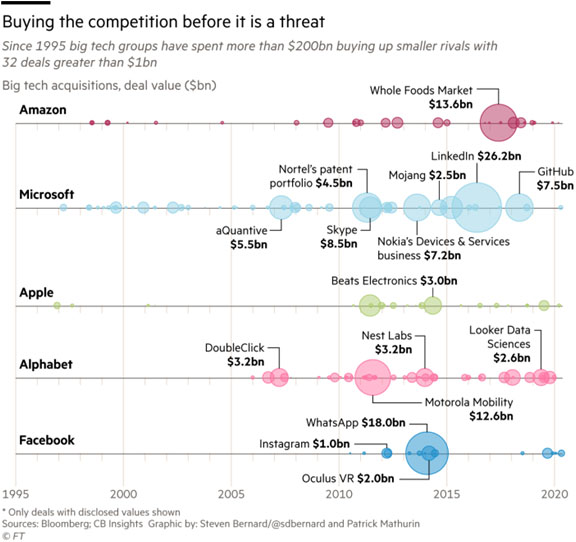Excellent study material for all civil services aspirants - begin learning - Kar ke dikhayenge!
BIG TECH MONEY MACHINES
Read more on - Polity | Economy | Schemes | S&T | Environment
- Lawmakers take note: The US Congress’s antitrust hearings in 2020 put the alleged systematic violations of competition laws by Google, Amazon, Facebook, and Apple under the spotlight. Big Tech money making is rooted in a business model that builds data monopolies at the expense of users, as it risks undermining not only data security and privacy but also the quality of information.
- Traditional monopolies versus Big Tech: Unlike traditional monopolies, data monopolies don’t result in higher prices for consumers, as the services offered are free of charge. However, these services are provided in exchange for personal data. To attract views they give a platform to harmful content, misinformation, and low-quality journalism. That damages democracy itself, as seen in recent events.
- Pure business: Big Tech companies are forging pure advertising business models for the collection, sale, and use of personal data, with the aim of gaining the user’s attention. This monetisation model, centred on selling user data to the highest bidder and getting as much data to as many bidders as possible, is inherently in conflict with data privacy. The collection of personal data can be viewed as a cost for the user and this is one of the reasons why data privacy is increasingly important for antitrust regulation in the digital era.
- Ad targeting model: The same ad targeting model relies on opaque algorithmic systems to create detailed user profiles. Such profiling enables the targeting of specific groups of people, who share certain characteristics, with often misleading messages. Social media platforms are designed to keep people engaged for as long as possible, so that greater volumes of data can be collected and used to further refine the algorithms. In short, while the platforms are optimised for targeted advertising, they are also designed to influence as many people as possible, but without prioritising the quality of information or the protection of personal data.
- Abuse of power: In the digital era, the abuse of market power is real. The key to understanding it is to look at the control of customer data by Big Tech companies. The major internet ecosystems have established near-monopolies in their respective sectors by producing apps that combine user interface, software code, and personal data, and are controlled from their own cloud servers. Most online data is siloed on the servers of companies like Google, Facebook, and Twitter, and is monetised through targeted advertising. This implies that, if users move to a rival service, they lose their data.
- Damaging others: Big Tech can use this wealth of data to spy on competitors, acquire important information on them, and use it to reinforce their own dominance. The US Congress doesn’t have any authority to enforce competition legislation or to impose fines on Big Tech. However, Congress’s hearing showed that, while competition laws were not conceived for the digital economy, antitrust is a critical issue in for the tech giants and tackling it will probably require a reframing of existing legislation.
- Future coming: Big Tech will be the prime target for antitrust regulation which, together with data privacy, will result in increased oversight and possibly fines. Arguments advocating the break-up of companies are gaining momentum, but regulators will mainly intervene to address the unfair control of data. Forcing companies to open up their data might be a useful remedy at the regulators’ disposal to ensure that new entrants compete for business on a level playing field.
- What regulators think: Regulators, especially in Europe, are increasingly looking at interoperability of data as a possible solution. Companies would be required to hand over personal data to competitors, without the user losing what they have built up on a platform. In this scenario, users would be able to manage, through a single service, the personal data they hold and share, or try out a digital service that uses their information in a new way.
- In the coming years, regulators are likely to crack down on some of the big internet ecosystems, such as Amazon, Google, Facebook, and Twitter, in 10 key regulatory arenas (see below). Antitrust has been and will continue to be a major regulatory plague for Big Tech.
- However, in the future, control of data will be the key regulatory issue, with data privacy gaining prominence. In aspects like content, online harm, and obstruction of justice, the tech giants will be asked to adopt a duty of care or face tighter control, with internet ecosystems like Amazon, Alphabet, Facebook, and Apple being particularly vulnerable.
- Summary: In these areas, including copyright, a big divide is emerging between traditional publishers and broadcasters that are, by and large, trusted for their reputable, high quality content, and tech giants that refuse to bear responsibility for the toxic and sometimes illegal content they publish. As the 2021 Australian law shows, sovereigns may not sit idle for long now.
* Content sourced from free internet sources (publications, PIB site, international sites, etc.). Take your own subscriptions. Copyrights acknowledged.












